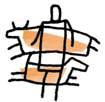HUMAN-ANIMAL RELATIONSHIPS IN ZOOS: OPTIMISING ANIMAL AND VISITOR EXPERIENCES
Extensive research on human-animal relationships in agricultural and domestic settings shows that human-animal interaction affects animal behaviour and welfare, which in turn affect human attitudes to animals. As conservation and welfare organisations, zoos aim to provide visitors with opportunities to closely interact with animals to improve visitor experience and conservation outcomes, whilst maintaining good animal welfare. Some visitor interactions may be stressful for some animals creating conflict between animal welfare and visitor experience. By determining visitor effects, this project aims to provide zoos with practical animal management and educational strategies to optimise both animal welfare and visitor experience.
Working with collaborators from Deakin University (DU) and the Department of Jobs, Precincts and Regions (DJPR) together with industry partners Zoos Victoria (ZV), Taronga Conservation Society (TCS) and Detect Australia (DTA) this Australian Research Council Linkage Project concluded in late 2018 and the final report has been sent to the Australian Research Council. This project has supported several PhD students.
Investigators: Paul Hemsworth, Grahame Coleman, Roger Rassool, Kerry Fanson (DU), Kym Butler (DJPR), Michael Magrath (ZV), Vicky Melfi (TCS) and David Peake (DTA).
For further details, please contact Paul Hemsworth.
Extensive research on human-animal relationships in agricultural and domestic settings shows that human-animal interaction affects animal behaviour and welfare, which in turn affect human attitudes to animals. As conservation and welfare organisations, zoos aim to provide visitors with opportunities to closely interact with animals to improve visitor experience and conservation outcomes, whilst maintaining good animal welfare. Some visitor interactions may be stressful for some animals creating conflict between animal welfare and visitor experience. By determining visitor effects, this project aims to provide zoos with practical animal management and educational strategies to optimise both animal welfare and visitor experience.
Working with collaborators from Deakin University (DU) and the Department of Jobs, Precincts and Regions (DJPR) together with industry partners Zoos Victoria (ZV), Taronga Conservation Society (TCS) and Detect Australia (DTA) this Australian Research Council Linkage Project concluded in late 2018 and the final report has been sent to the Australian Research Council. This project has supported several PhD students.
Investigators: Paul Hemsworth, Grahame Coleman, Roger Rassool, Kerry Fanson (DU), Kym Butler (DJPR), Michael Magrath (ZV), Vicky Melfi (TCS) and David Peake (DTA).
For further details, please contact Paul Hemsworth.
LEAD AMMUNITION IN THE AUSTRALIAN ENVIRONMENT: ASSESSING THE RISKS TO PEOPLE AND WILDLIFE
There is growing worldwide recognition of the threat posed by toxic lead (Pb)-based ammunition for wildlife and humans. Consuming animal tissues contaminated with lead risks harmful lead exposure and, thus, the health and welfare of wildlife scavengers and human consumers of game meat. Aside from lethal effects on poisoned animals, more subtle but debilitating non-lethal effects have been observed from lead exposure and these long-term deleterious effects on individuals can have negative effect on wildlife populations. Mortality or morbidity caused by lead may be important factors for the conservation status of these species. The aims of this study are to quantify lead exposure levels in at-risk Australian wildlife and domestic animals, and to examine public health risks associated with lead contamination of game meat sold commercially and harvested recreationally.
This research involves broad collaboration with research partners overseas, as well as collaborators from the University of Tasmania, Deakin University, the NSW Department of Primary Industries, the Victorian Game Management Authority, as well as the University of Melbourne One Health Research Group. This project is funded by the McKenzie Fellowship Program and began in late 2020.
For further details, please contact Jordan Hampton.
There is growing worldwide recognition of the threat posed by toxic lead (Pb)-based ammunition for wildlife and humans. Consuming animal tissues contaminated with lead risks harmful lead exposure and, thus, the health and welfare of wildlife scavengers and human consumers of game meat. Aside from lethal effects on poisoned animals, more subtle but debilitating non-lethal effects have been observed from lead exposure and these long-term deleterious effects on individuals can have negative effect on wildlife populations. Mortality or morbidity caused by lead may be important factors for the conservation status of these species. The aims of this study are to quantify lead exposure levels in at-risk Australian wildlife and domestic animals, and to examine public health risks associated with lead contamination of game meat sold commercially and harvested recreationally.
This research involves broad collaboration with research partners overseas, as well as collaborators from the University of Tasmania, Deakin University, the NSW Department of Primary Industries, the Victorian Game Management Authority, as well as the University of Melbourne One Health Research Group. This project is funded by the McKenzie Fellowship Program and began in late 2020.
For further details, please contact Jordan Hampton.


